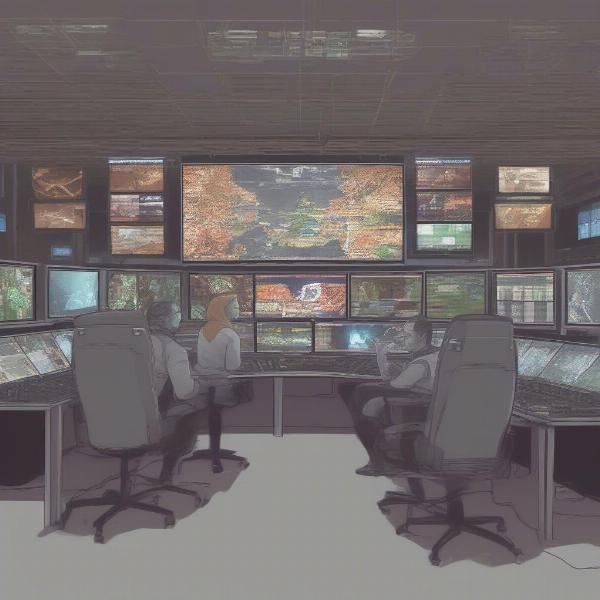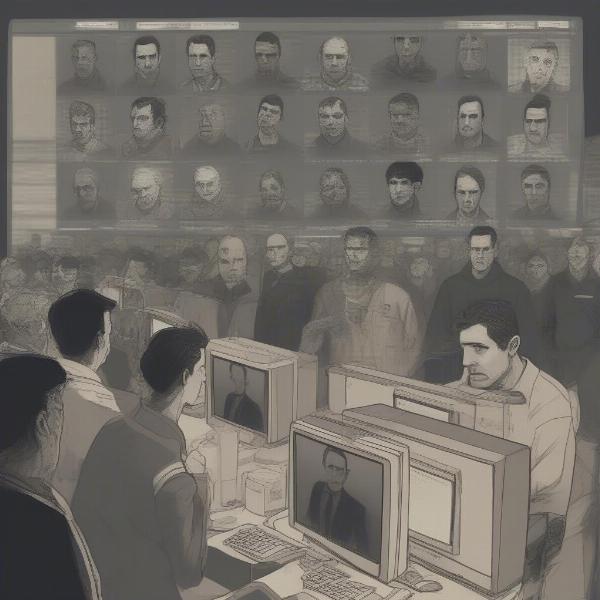The Gamemakers are the puppet masters of The Hunger Games, the all-powerful individuals behind the scenes who control the tributes’ fates. But who are they, exactly, and how do they operate within Panem’s twisted spectacle? This article delves into the enigmatic world of the Gamemakers, exploring their role, motivations, and the impact they have on the Games and its participants.
Unmasking the Gamemakers: The Architects of Brutality
The Gamemakers are a select group of individuals responsible for designing, controlling, and manipulating the Hunger Games arena. They hold the power of life and death over the tributes, introducing challenges, creating obstacles, and ultimately deciding who survives. Their decisions are often driven by a desire for entertainment and a need to maintain the Capitol’s control over the districts.
Inside the Control Room: How the Gamemakers Operate
The Gamemakers operate from a high-tech control room beneath the arena, observing the tributes through an intricate network of cameras and sensors. They use advanced technology to manipulate the environment, triggering natural disasters, releasing mutated creatures, and even altering the landscape itself. Their decisions are often made on a whim, influenced by their personal biases and the desire to create dramatic moments for the Capitol audience.
The Psychology of Power: Exploring the Gamemakers’ Motivations
What motivates these individuals to orchestrate such cruelty? Some are driven by a sadistic pleasure in watching others suffer, while others see it as a necessary evil to maintain order in Panem. The Gamemakers represent the detached and privileged elite of the Capitol, a stark contrast to the struggling districts. Their actions reflect the deep-seated inequalities and power dynamics at the heart of Panem’s society.
 Gamemakers in the control room manipulating the Hunger Games arena
Gamemakers in the control room manipulating the Hunger Games arena
The Impact of the Gamemakers on the Tributes and the Games
The Gamemakers’ influence extends far beyond the arena itself. Their decisions shape the narrative of the Games, influencing public perception and manipulating the outcome to suit the Capitol’s agenda. They can turn underdogs into heroes and villains into martyrs, all in the name of entertainment. The tributes are mere pawns in their elaborate game, their lives subject to the whims of these unseen puppet masters.
Beyond the Games: The Gamemakers’ Role in Panem’s Society
The Gamemakers are more than just arena designers; they are symbols of the Capitol’s power and control. Their presence reinforces the message that the districts are subservient to the Capitol, and that their lives are expendable. Their role in the Hunger Games is a brutal reminder of the consequences of rebellion and the price of defiance.
 Gamemakers observing the tributes in the Hunger Games arena
Gamemakers observing the tributes in the Hunger Games arena
The Ethics of Entertainment: Questioning the Gamemakers’ Actions
The actions of the Gamemakers raise serious ethical questions about the nature of entertainment and the limits of power. Is it justifiable to sacrifice human lives for the sake of spectacle? The Hunger Games forces viewers to confront these uncomfortable questions and consider the consequences of unchecked power and societal inequality.
The Future of the Games: Will the Gamemakers Always Hold the Power?
As the rebellion gains momentum, the Gamemakers’ grip on power begins to weaken. The future of the Hunger Games, and the role of the Gamemakers within it, becomes uncertain. Will they continue to orchestrate the Games, or will their reign of terror finally come to an end?
Are the Gamemakers Human? Examining Their Morality
Despite their power, the Gamemakers are still human, capable of both compassion and cruelty. Some struggle with the moral implications of their actions, while others embrace the power they wield. Examining their motivations and decisions provides insight into the complexities of human nature and the corrupting influence of absolute power.
Conclusion
The Gamemakers are the architects of the Hunger Games, the unseen force that shapes the fate of the tributes. Their motivations are complex, their actions brutal, and their impact profound. Understanding their role is key to understanding the Hunger Games and the dystopian society of Panem. Who are the Gamemakers? They are the embodiment of the Capitol’s cruelty, a chilling reminder of the dangers of unchecked power and the importance of fighting for a just and equitable society. What are your thoughts on the Gamemakers and their role in the Hunger Games? Share your opinions in the comments below.
FAQ
- Who is the Head Gamemaker in the Hunger Games? Seneca Crane is the Head Gamemaker in the first book. Later, Plutarch Heavensbee takes over.
- Do the Gamemakers ever show remorse for their actions? Some Gamemakers, like Plutarch Heavensbee, secretly work against the Capitol, suggesting a level of remorse or dissent.
- How are Gamemakers chosen? The selection process is not explicitly stated, but it’s implied that they are chosen from the Capitol’s elite.
- Can Gamemakers be punished for their decisions? Yes, as seen with Seneca Crane’s execution after the events of the 74th Hunger Games.
- What is the purpose of the Gamemakers in the Hunger Games? They design, control, and manipulate the Games to entertain the Capitol and maintain control over the districts.
- Do Gamemakers ever participate in the Games themselves? No, the Gamemakers are always from the Capitol and never participate as tributes.
- How do the Gamemakers communicate with each other? They likely use a sophisticated communication system within their control room.

